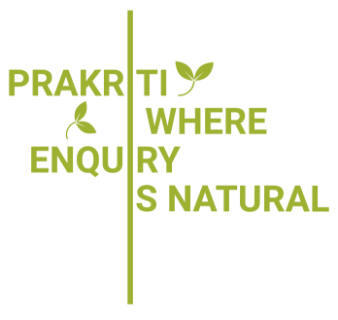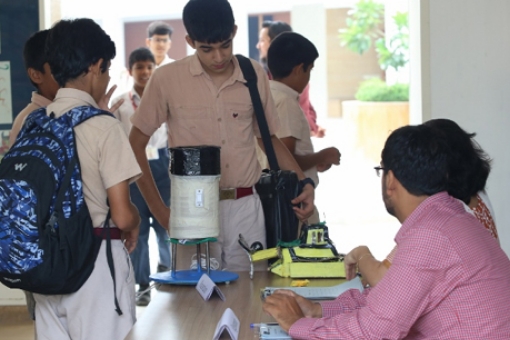
THE PRAKRITI the STEM hub
The Prakriti Hub is an experiential, multi-disciplinary STEM space that inspires out of the box innovations and stimulates deep enquiry into the laws of nature and the processes of the natural world. Equipped with state-of the art facilities for learning in the Natural Sciences, Mathematics and Information Technology it supports specialised enquiry into each of its parent disciplines and also brings them together to foster a maker-centric, design-thinking approach to problem-solving and research.
Encouraging Deep Dives
Disciplinary enquiry in the Prakriti Hub is encouraged under the aegis of the Science, Mathematics and Information Technology Subject Societies. From inviting guest speakers, partnering with leading think tanks and research institutes, organising field trips, seminars, lectures and reading sessions, these Societies ignite curiousity and inspire students to take deep dives into their disciplinary learning by curating experiences that are deeply authentic, experiential and engaging. Middle and Senior students select a Subject Society of their choice and receive mentored support as they pursue an ‘orbital’ project revolving around an area of personal passion or interest.


Inspiring MAGIC!
The constituent disciplines of the Hub come together to help students experience MAGIC! as they use design thinking pedagogies to tinker and innovate.
MAGIC! hour (Making Art, Genius, Imagination and Creativity) is a special Hub initiative giving students the opportunity to blend diverse disciplinary insights and learn by doing as they attempt to design contextual and creative solutions by a process of experimentation, iteration and innovation.
The Hub also hosts a flagship, inter-school, design-thinking challenge known as, Together We Can – A Challenge of eSTEAM! (Science, Technology, Enterprise, Art and Mathematics)
As part of the challenge, our School team partners with an industry or community based organisation to identify a need i.e. a real world design task of significance to the community, and then proposes the task of designing a solution for the same, to the students. Participating students receive mentoring in the design-thinking process and are supported as they to attempt to use the tenets of the process to think creatively, plan effectively, work collaboratively and make optimal use of resources.
A noteworthy feature of the initiative is the meaningful and exciting alternative it offers to the common-place competitive challenges that traditionally take place where the purpose of participation often becomes simply one of vying for the ‘trophy’. In contrast to these, Together We Can provides an authentic and constructive context, much like a societal tender process for student teams to put together their best efforts and debate the merits of each others’ solutions, before selecting the one that best serves the identified community need. In this case it is the originality and ingenuity of a proposed solution that becomes the aspired for ‘trophy’ and the motivation for participation.
Uniquely, the contest format also places part of the onus for selecting this ‘best solution’ on the students themselves as they engage in a critical process of peer review and provide their very own feedback to an expert panel of eminent judges responsible for arriving at the final decision.
As part of the challenge, students have compiled a book of traditional recipes using organic ingredients produced by Navdanya, a bespoke heritage tour for young people in collaboration with the tourist organisation Delhi By Foot, as well as solutions and mechanisms to prevent, abate and measure air pollution in our cities. They have also looked at designing sustainable, natural alternatives to plastic packaging used in the hospitality industry.









